2013 PEUGEOT 2008 cooling
[x] Cancel search: coolingPage 31 of 324

1
29
Instruments and controls
Warning / indicator lampStateCauseAction / Observations
Brakingfixed. The braking system fluid level has
dropped significantly. You must stop as soon as it is safe to do so.
Top up with brake fluid listed by PEUGEOT.
If the problem persists, have the system checked by aPEUGEOT dealer or a qualified workshop.
+
fixed, associated
with the ABS warnin
g lamp. Th
e electronic brake force distribution
(EBFD) system has a fault. You must stop as soon as it is safe to do so.
Have it checked by a PEUGEOT dealer or a qualified workshop.
Maximumcoolanttemperature
fixed with the needlein the red zone. The temperature of the coolingsystem is too high. Stop as soon as it is safe to do so.
Wait until the engine has cooled down before toppingup the level, if necessary.
If the problem persists, contact a PEUGEOT dealer or
a qualified workshop.
Anti-lockBraking System(ABS)
fixed. The anti-lock braking system has a
fault. The vehicle retains conventional braking.
Drive carefully at reduced speed and contact a
PEUGEOT dealer or a qualified workshop without
delay.
Dynamic stability control(DSC/ASR)
flashing. The DSC/ASR regulation is
operating. The system optimises traction and improves the
directional stability of the vehicle.
fixed. Unless it has been deactivated (button pressed and its indicator lamp
on) the DSC/ASR system has a fault. Have it checked by a PEU
GEOT or a qualified
workshop.
Page 35 of 324
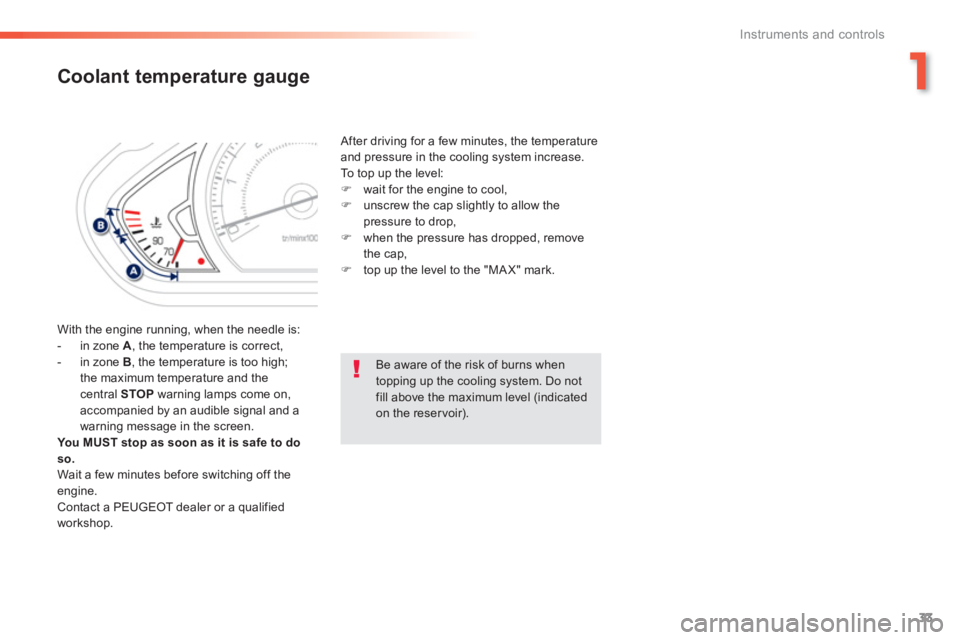
1
33
Instruments and controls
Coolant temperature gauge
With the engine running, when the needle is:
- in zone A
, the temperature is correct,
- in zone B, the temperature is too high;
the maximum temperature and the central STOP
warning lamps come on,accompanied by an audible signal and a
warning message in the screen.
You MUST stop as soon as it is safe to do so. Wait a few minutes before switching off theengine.
Contact a PEUGEOT dealer or a qualified
wor
kshop.
After drivin
g for a few minutes, the temperatureand pressure in the cooling system increase.
To top up the level:
�) wait for the engine to cool, �)
unscrew the cap slightly to allow the
pressure to drop,
�) when the pressure has dropped, remove
the cap,�) top up the level to the "MA X" mark.
Be aware of the risk of burns whentopping up the cooling system. Do not fill above the maximum level (indicatedon the reservoir).
Page 65 of 324
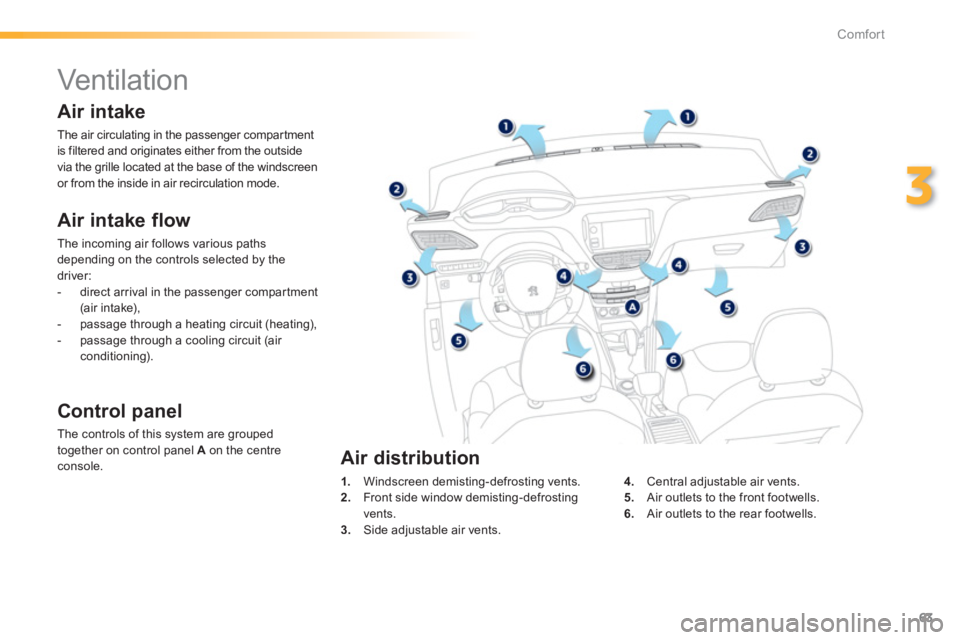
63
3
Comfort
Vent ilat ion
Air intake flow
The incoming air follows various paths
depending on the controls selected by the
driver:
- direct arrival in the passenger compartment (air intake),
- passage through a heating circuit (heating),
- passage through a cooling circuit (air conditioning).
Control panel
The controls of this system are grouped
together on control panel A on the centre console. 1.Windscreen demisting-defrosting vents.2.
Front side window demisting-defrosting
vents. 3. Side adjustable air vents.
4.Central adjustable air vents.
5.Air outlets to the front footwells.
6. Air outlets to the rear footwells.
Air distribution
Air intake
The air circulating in the passenger compartment
is filtered and originates either from the outside
via the grille located at the base of the windscreen or from the inside in air recirculation mode.
Page 70 of 324
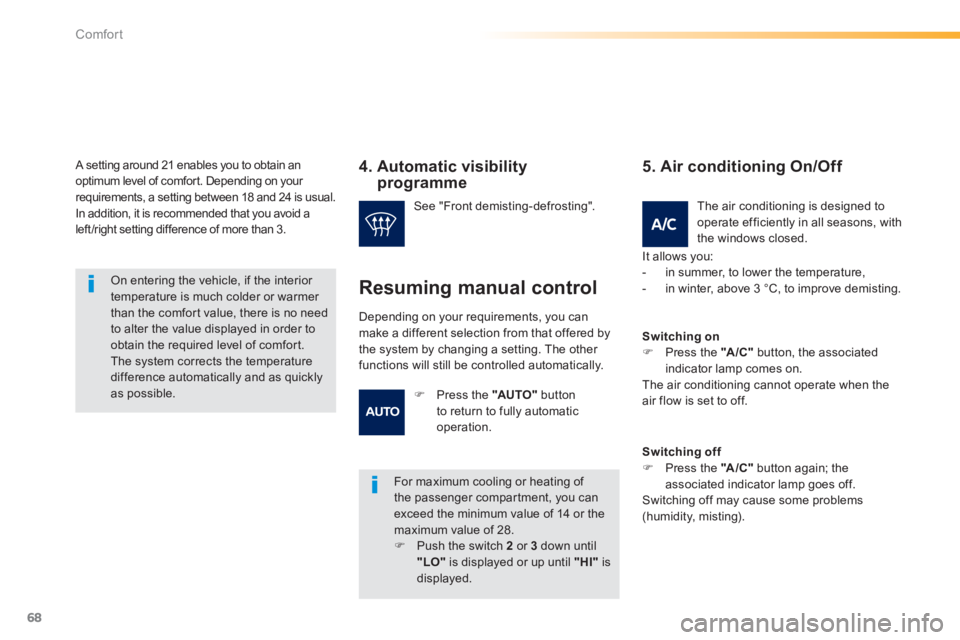
68
Comfort
A setting around 21 enables you to obtain an
optimum level of comfort. Depending on your requirements, a setting between 18 and 24 is usual.
In addition, it is recommended that you avoid a
left/ri
ght setting difference of more than 3.
On entering the vehicle, if the interior temperature is much colder or warmer than the comfort value, there is no need to alter the value displayed in order to obtain the required level of comfort. The system corrects the temperaturedifference automatically and as quicklyas possible.
4. Automatic visibilityprogramme
For maximum cooling or heating of the passenger compartment, you can exceed the minimum value of 14 or the maximum value of 28.�)Push the switch 2or 3down until"LO"
is displayed or up until "HI"
is displayed. See "Front demistin
g-defrosting".
Dependin
g on your requirements, you can
make a different selection from that offered by
the system by changing a setting. The other
functions will still be controlled automatically.
Resuming manual control
The air conditioning is designed to
operate efficiently in all seasons, with
t
he windows closed.
5. Air conditioning On/Off
It allows you:
- in summer, to lower the temperature,
- in winter, above 3 °C, to improve demisting.
Switchin
g on�)Press the "A/C"button, the associated
indicator lamp comes on.
The air conditioning cannot operate when theair flow is set to off.
Switchin
g off�)Press the "A/C"
button again; the associated indicator lamp goes off.
Switching off may cause some problems (humidity, misting).
�)Press the "AUTO"button
to return to fully automatic
operation.
Page 182 of 324

180
Practical information
Driving advice
Distribution of loads
�)Distribute the load in the trailer so that theheaviest items are as close as possible to
the axle and the nose weight approaches the maximum permitted without exceeding it.
Air density decreases with altitude, thus reducing engine performance. Above1 000 metres, the maximum towed load must
be reduced by 10 % for every 1 000 metres of altitude.
Side wind
�)Take into account the increased sensitivity
to side wind.
Cooling
To w i ng a trailer on a slope increases the
temperature of the coolant.
As the fan is electricall
y controlled, its cooling capacity is not dependent on the engine speed.�)
To lower the engine speed, reduce your speed.
The maximum towed load on a long incline
depends on the gradient and the ambient
tem
perature.
In all cases, keep a check on the coolant
temperature.
�)If the warning lamp and the
STOP warning lamp come on, stop the vehicle and switch off
the engine as soon as possible.
Braking
To w i ng a trailer increases the braking distance.
To avoid overheating of the brakes on a longmountain type of descent, the use of engine braking is recommended.
Tyres
�)Check the tyre pressures of the towingvehicle and of the trailer, obser ving the recommended pressures.
Lighting
�)Check the electrical lighting and signalling on the trailer.
The rear parking sensors will be deactivated automatically if a genuine PEUGEOT towbar is used.
R
efer to the "Technical data" section for details
of the weights and towed loads which apply to your vehicle.
Page 195 of 324
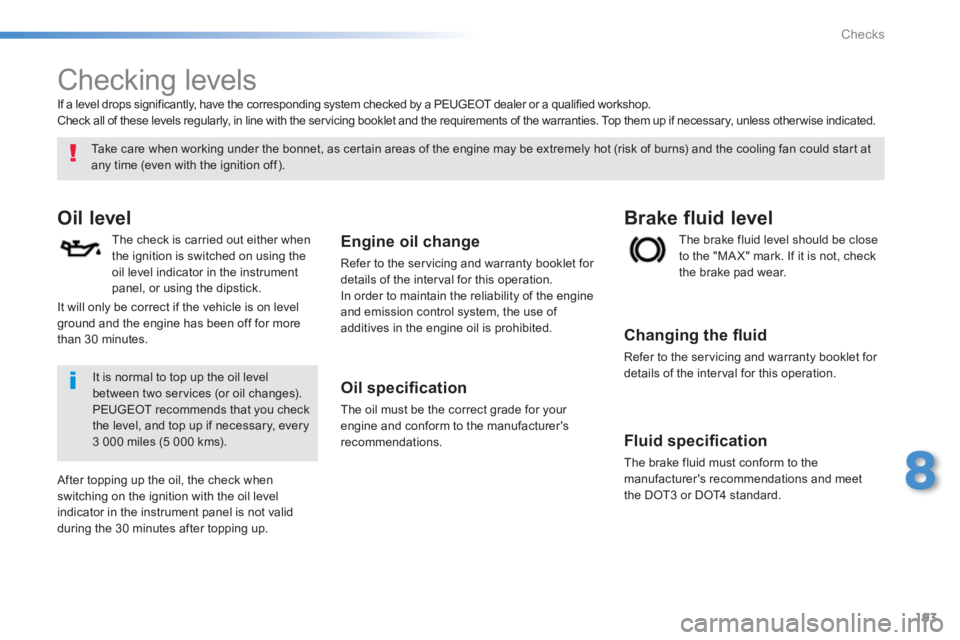
193
8
Checks
Checking levels
Oil level
The check is carried out either when
the ignition is switched on using theoil level indicator in the instrumentpanel, or using the dipstick.
Engine oil change
Refer to the servicing and warranty booklet for
details of the inter val for this operation.
In order to maintain the reliabilit
y of the engine and emission control system, the use of additives in the engine oil is prohibited.
Oil specifi cation
The oil must be the correct grade for your
engine and conform to the manufacturer'srecommendations.
Th
e brake fluid level should be close
to the "MA X" mark. If it is not, check
the brake pad wear.
Brake fluid level
Changing the fl uid
Refer to the ser vicing and warranty booklet for
details of the interval for this operation.
Fluid specifi cation
The brake fluid must conform to themanufacturer's recommendations and meet
the DOT3 or DOT4 standard.
Take care when working under the bonnet, as certain areas of the engine may be extremely hot (risk of burns) and the cooling fan could star t at
any time (even with the ignition off).
If a level drops si
gnificantly, have the corresponding system checked by a PEUGEOT dealer or a qualified workshop.
Check all of these levels regularly, in line with the ser vicing booklet and the requirements of the warranties. Top them up if necessary, unless other wise indicated.
It is normal to top up the oil levelbetween two ser vices (or oil changes).PEUGEOT recommends that you check the level, and top up if necessary, every
3 000 miles (5 000 kms).
After topping up the oil, the check when switching on the ignition with the oil level
indicator in the instrument panel is not valid
durin
g the 30 minutes after topping up. It will onl
y be correct if the vehicle is on level ground and the engine has been off for more
than 30 minutes.
Page 196 of 324
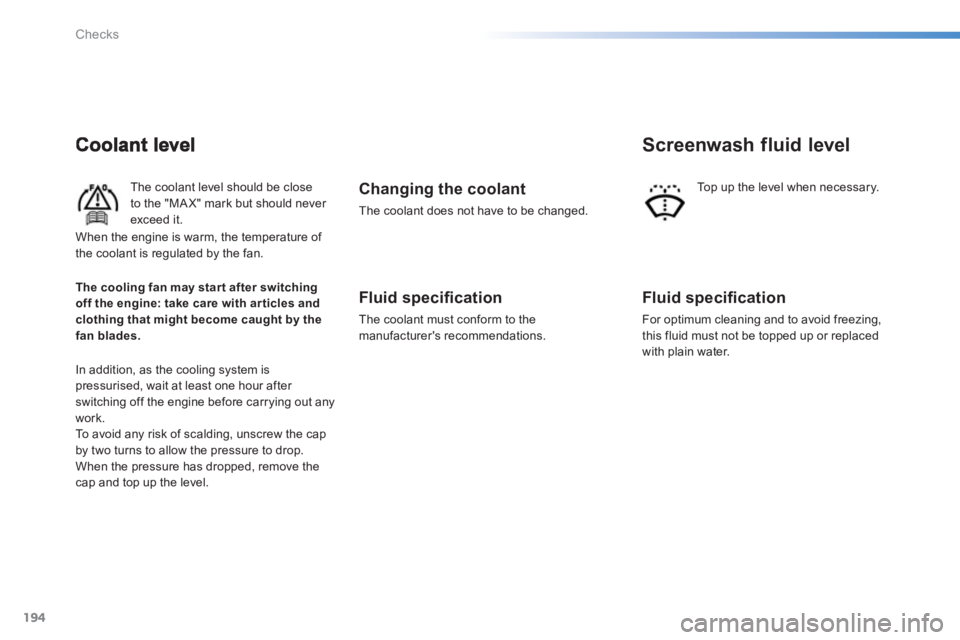
194
Checks
The coolant level should be close
to the "MA X" mark but should never exceed it.
In addition, as the cooling system is
pressurised, wait at least one hour after switching off the engine before carrying out any
work.
To avoid any risk of scalding, unscrew the cap
by two turns to allow the pressure to drop.When the pressure has dropped, remove the cap and top up the level.
Changing the coolant
The coolant does not have to be changed.
Fluid specifi cation
The coolant must conform to the
manufacturer's recommendations.
Fluid specifi cation
For optimum cleaning and to avoid freezing,
this fluid must not be topped up or replaced
with plain water.
Screenwash fluid level
Top up the level when necessary.
When the engine is warm, the temperature o
f
the coolant is regulated by the fan.
The cooling fan may star t after switching
off the engine: take care with ar ticles andclothing that might become caught by thefan blades.